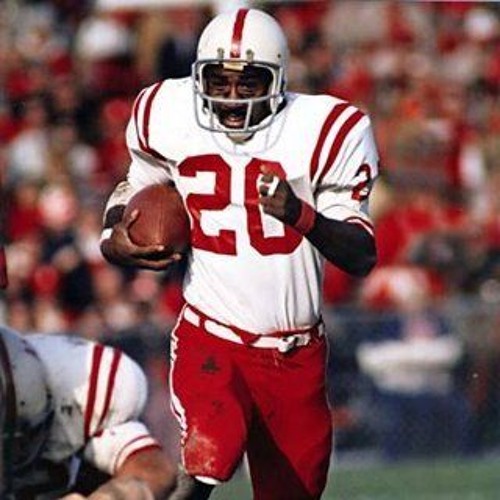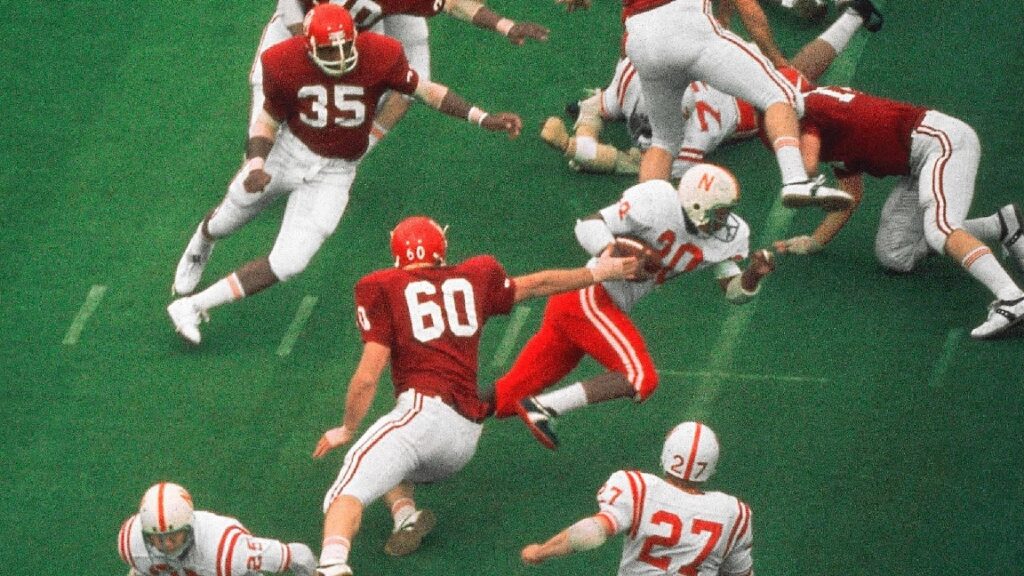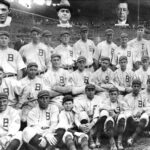Johnny “The Jet” Rodgers
The Sports Then and Now Vintage Athlete of the Month was one of the most electrifying players in college football history.
Known as “The Jet” for his incredible speed and agility, 1972 Heisman Trophy Winner Johnny Rodgers was a versatile playmaker who dazzled fans and dominated opponents during his career at the University of Nebraska. His achievements on the field and his impact on college football have earned him a place among the sport’s all-time greats.
Early Life and High School Stardom
Johnny Steven Rodgers was born on July 5, 1951, in Omaha, Nebraska. From a young age, Rodgers displayed a natural talent for sports, particularly football. Attending Omaha’s Tech High School, he quickly established himself as a standout athlete, excelling not only in football but also in track and field. His speed, vision, and elusiveness made him a nightmare for opposing defenses, and he soon became one of the most sought-after recruits in the country.
Rodgers chose to stay close to home, committing to the University of Nebraska, where he would play under the legendary head coach Bob Devaney. At Nebraska, Rodgers’ talents would reach new heights, and he would become a key figure in one of the most successful periods in the school’s football history.
College Career at Nebraska
Johnny Rodgers’ college career at Nebraska is the stuff of legend. He was a versatile player who excelled as a wide receiver, running back, and kick returner. His ability to score from anywhere on the field made him a constant threat and a fan favorite. From the moment he stepped onto the field, it was clear that Rodgers was a special talent.
As a sophomore in 1970, Rodgers helped lead Nebraska to its first national championship. He continued to build on that success in 1971, playing a crucial role in Nebraska’s second consecutive national title. During these years, Rodgers showcased his ability to make game-changing plays, whether it was catching a pass, returning a punt, or taking a handoff.
One of the most memorable moments of Rodgers’ career came in the 1971 “Game of the Century,” a matchup between unbeaten Nebraska and unbeaten Oklahoma. In that game, Rodgers returned a punt 72 yards for a touchdown, a play that is still considered one of the greatest in college football history. Nebraska won the game 35-31, and Rodgers’ heroics helped secure the victory and preserve Nebraska’s perfect season.
The 1972 Heisman Trophy Season
The 1972 season was Johnny Rodgers’ crowning achievement. As a senior, he put together one of the most impressive individual seasons in college football history. Rodgers amassed 2,011 all-purpose yards, scoring 17 touchdowns in the process. He was a threat every time he touched the ball, whether as a receiver, runner, or returner. His ability to change the course of a game with a single play made him the most dangerous player in the country.
Rodgers’ versatility and explosive playmaking earned him widespread recognition, and he was awarded the Heisman Trophy as the nation’s most outstanding player. He became the first player in Nebraska history to win the prestigious award, cementing his place in college football lore. Rodgers finished the season with 1,019 receiving yards, 348 rushing yards, and 618 return yards, along with 12 touchdown receptions and three punt return touchdowns. His performance that year was not only a testament to his individual talent but also a reflection of his ability to rise to the occasion in the biggest moments.
In the 1973 Orange Bowl, his final college game, Rodgers delivered a performance for the ages. He caught three touchdown passes, rushed for another, and threw a touchdown pass, leading Nebraska to a 40-6 victory over Notre Dame. This game served as a fitting conclusion to his illustrious college career and further solidified his status as one of the greatest players in Nebraska history.
Professional Career and Legacy
After his historic college career, Johnny Rodgers was selected by the San Diego Chargers in the first round of the 1973 NFL Draft. However, Rodgers chose to begin his professional career in the Canadian Football League (CFL) with the Montreal Alouettes. His decision was influenced by the opportunity for immediate playing time and financial incentives.
Rodgers made an immediate impact in the CFL, earning Rookie of the Year honors in 1973 and helping the Alouettes win the Grey Cup in 1974. He was named the CFL’s Most Outstanding Player in 1974, becoming one of the few players to achieve such honors in both college and professional football.
In 1977, Rodgers returned to the United States to play for the San Diego Chargers in the NFL, but injuries limited his effectiveness, and his NFL career was short-lived. Despite the brevity of his professional career, Rodgers’ impact on the game remained significant.
Johnny Rodgers’ legacy in college football is enduring. He was inducted into the College Football Hall of Fame in 2000, a fitting tribute to a player who left an indelible mark on the sport. His number 20 jersey is retired by the University of Nebraska, and he is widely regarded as one of the greatest players in the history of college football.
Conclusion
Johnny Rodgers’ career was defined by his extraordinary athleticism, versatility, and ability to make big plays in crucial moments. As the 1972 Heisman Trophy winner, he set a standard for excellence that has inspired generations of players. His contributions to Nebraska’s football legacy and his impact on the sport continue to be celebrated by fans and historians alike. Rodgers’ story is one of talent, determination, and a love for the game that transcends time. His















